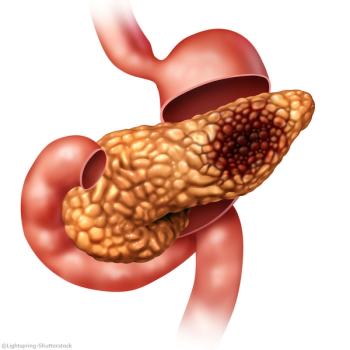
Oncology NEWS International
- Oncology NEWS International Vol 12 No 2
- Volume 12
- Issue 2
Telomerase Potential Cancer Biomarker
SEATTLE-Telomerase may be an early biomarker of pancreatobiliary malignancies, and telomerase enzyme immunostaining represents a potential breakthrough in screening for and diagnosing cancer in patients with biliary strictures, Tarun Mullick, MD, said at the president’s plenary session of the 67th Annual Meeting of the American College of Gastroenterology (ACG abstract 3).
SEATTLETelomerase may be an early biomarker of pancreatobiliary malignancies, and telomerase enzyme immunostaining represents a potential breakthrough in screening for and diagnosing cancer in patients with biliary strictures, Tarun Mullick, MD, said at the president’s plenary session of the 67th Annual Meeting of the American College of Gastroenterology (ACG abstract 3).
Current methods of screening for and diagnosing cholangiocarcinomas are inadequate, with endoscopic retrograde cholangiopancreatography (ERCP) brush cytology only 30% to 70% effective, Dr. Mullick said in an interview with ONI. "But having a biomarker may enhance your technique to something that is closer to 90% to 100% sensitive. Using a bio-marker is such a leap in concept; this is the first real study that looked at the possibility of doing this."
Telomerase is a reverse transcriptase. It synthesizes telomeric DNA, and its upregulation confers immortality to cancer cells, said Dr. Mullick, instructor of clinical internal medicine, Division of Gastroenterology and Hepatology, University of Virginia, Charlottesville.
At the ACG meeting, Dr. Mullick and his colleagues presented preliminary data on telomerase as a potential biomarker of cancer. These preliminary findings showed that 15 of 15 pancreatobiliary malignancies, including two cholangio-carcinomas, were telomerase positive, while 5 of 5 benign pancreatic ducts were telomerase negative.
In the current study, the investigators sought to determine the role of telomer-ase in differentiating benign bile ducts from cholangiocarcinoma in surgical resection specimens, and to determine the feasibility of utilizing telomerase enzyme detection with ERCP brush cytology in patients with benign and malignant biliary strictures.
Telomerase staining was performed on surgical resection specimens from 10 patients with cholangiocarcinoma and 10 with benign bile ducts. The researchers also assessed for telomerase enzyme in seven patients with biliary stricturefour who progressed to or were diagnosed with cancer and three with benign ductsusing ERCP brush cytology.
Dr. Mullick explained that telomerase antibody immunostaining is performed by first deparaffinizing and rehydrating tissues, and then retrieving the telomerase enzyme antigen. Primary and secondary antibody incubation are then performed, and the enzyme is visualized using AEC chromagen, which stains brown/red.
Of the 14 patients with cholangiocar-cinoma, all were found to be telomerase positive. The 13 patients with benign bile ducts were all telomerase negative. There were no significant differences between the patients with malignancies and those with benign ducts regarding age, sex, primary sclerosing cholangitis (PSC), length of history of PSC, colorectal cancer, and ulcerative colitis. Tumor stage and location also did not affect the level of tel-omerase expression.
"In this particular cohort, we can say that positive telomerase expression may differentiate cholangiocarcinoma from benign bile duct and merits further evaluation as a potential method to screen for and diagnose cholangiocarcinoma," Dr. Mullick said.
He noted that telomerase enzyme assay may become useful in ERCP brush cytology to help differentiate cholangio-carcinoma from benign bile ducts, "but this, of course, needs to be further validated with a larger number of patients, and the technique has to be improved."
Other key investigators in the study included Jason Tasch, PhD, Darwin Conwell, MD, and Gregory Zuccaro, Jr., MD, of the Cleveland Clinic Foundation; Paul Yeaton, MD, of the University of Virginia; and Adrian Ormsby, MBBS, of the Henry Ford Institute, Detroit.
Articles in this issue
about 23 years ago
Some Activity for Gefitinib in Heavily Pretreated Breast Cancerabout 23 years ago
Brachytherapy Results Similar for Blacks, Whitesabout 23 years ago
Dose-Dense Chemo Ups Survival in Node+ Breast Cancerabout 23 years ago
MR Spectroscopy IDs Breast Cancers, Node Involvementabout 23 years ago
ODAC Wants More Data on Expanded Casodex Indicationabout 23 years ago
SuperGen Submits First NDA Module for Pancreatic Cancer Drugabout 23 years ago
Two Added to ONI’s Oncology Nursing Editorial Advisory Boardabout 23 years ago
Bortezomib Active in Relapsed/Refractory Myelomaabout 23 years ago
Developing Targeted Therapy More Difficult Than AnticipatedNewsletter
Stay up to date on recent advances in the multidisciplinary approach to cancer.






































